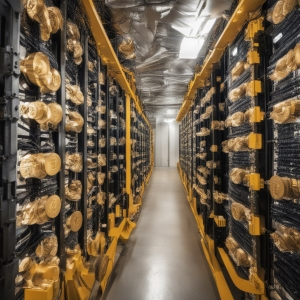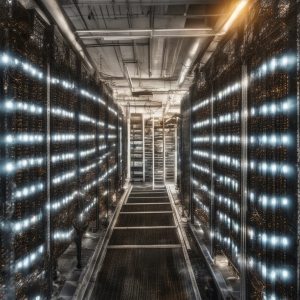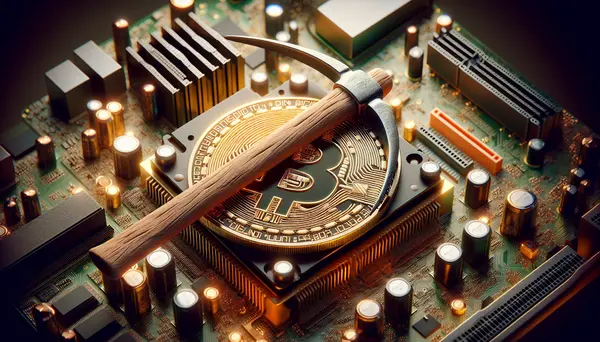Table of Contents:
Introduction: Understanding the Role of Bitcoin Mining
If you are relatively new to the crypto world, the concept of bitcoin mining may seem somewhat baffling. However, don't worry. We wrote this article with absolute beginners in mind. By the time you've reached the end of this post, you'll have a clear answer to the question: What is the role of bitcoin mining in the cryptocurrency ecosystem?
Bitcoin mining is an integral component of the cryptocurrency ecosystem. It serves to verify the validity of transactions, maintain the integrity of the blockchain, and generate new bitcoins. Mining maintains the decentralized nature of the bitcoin network, preventing any single entity from having control over the entire system. To ensure we are all on the same page, let's dive deeper into the role of bitcoin mining and its importance.
Get $500 free Bitcoin mining for a free testing phase:
- Real daily rewards
- 1 full month of testing
- No strings attached
If you choose to buy after testing, you can keep your mining rewards and receive up to 20% bonus on top.
The Fundamentals of Bitcoin Mining
At its heart, bitcoin mining is the process through which new bitcoins are created and transactions are added to the blockchain. This is achieved via powerful computers that solve complex mathematical problems. These problems are integral to the underlying security of the bitcoin network.
The high level of difficulty in these problems ensures security and fairness. Security comes from the fact that these problems are hard to solve but easy to verify. This means that once a miner has solved a problem, everyone on the network can easily confirm that the solution is correct. Additionally, fairness stems from the system's design: the first miner to solve the problem gets rewarded with newly minted bitcoins and transaction fees.
By resolving these issues, miners help to prevent 'double-spending'. This term refers to a scenario where someone tries to use the same bitcoins for more than one transaction. Mining makes this almost impossible, thus adding a crucial layer of trust and transparency to the bitcoin network.
The Impacts of Bitcoin Mining in the Cryptocurrency World
| Pros | Cons |
|---|---|
| Provides security and transaction validation to the network | Consumes large amounts of electricity, contributing to environmental concerns |
| Promotes decentralization and prevents any single entity from controlling the network | Requires significant computational power, favoring participants with more resources |
| Creates a financial incentive for participants to maintain the network | Prone to market volatility, which can make mining operation financially unstable |
| Encourages innovation and advancements in technology | The reward halving can discourage smaller miners and increase centralization |
The Mechanics Behind Bitcoin Mining

As we delve into the mechanics of bitcoin mining, it is essential to know that the process stands on two pillars: Proof of Work and the mining reward system.
Proof of Work (PoW) refers to the system that bitcoin uses to ensure that the effort of miners is duly rewarded. In simple terms, every miner has to prove that their computer contributed effort (work) to solve the complex mathematical problem necessary for verifying transactions. The PoW system ensures that the consensus within the bitcoin network is decentralized and democratic.
The mining reward is the incentive for miners to do their job. It consists of two parts: new bitcoins (also known as the 'block reward') and transaction fees. Initially, the block reward was 50 bitcoins. However, it halves every four years (approximately every 210,000 blocks). The last halving event occurred in 2020, reducing the block reward to 6.25 bitcoins.
Transaction fees also provide a significant part of the mining rewards. When users send bitcoins, they can choose to pay a fee to incentivize miners to include their transactions more quickly in the blockchain. As the block reward continues to halve in the future, transaction fees will become an increasingly crucial part of miners' revenue.
Why is Bitcoin Mining Essential to the Cryptocurrency Ecosystem?
Bitcoin mining plays a vital role in the cryptocurrency ecosystem for several reasons. First and foremost, it ensures the security of the bitcoin network. Miners do not just create new bitcoins; they also verify transactions and secure the network by making it expensive and extremely difficult for any potential bad actors to manipulate transaction data.
Secondly, bitcoin mining leads to the creation of new bitcoins. This helps keep the bitcoin economy afloat. The miners earn new bitcoins as rewards, effectively bringing new coins into circulation.
Thirdly, mining's competitive nature fosters continual technological advancement and the evolution of more efficient mining hardware. This competition fuels innovation in the mining sector, driving improvements in mining equipment efficiency and effectiveness.
In addition, mining ensures transactional transparency. The blockchain is an open ledger, and by constantly adding verified transactions to it, miners help maintain its transparency. This is a fundamental aspect of blockchain technology that offers opportunities for innovative use cases far beyond cryptocurrencies.
Lastly, mining fosters decentralization in the Bitcoin network, which is a cornerstone value in the philosophy of cryptocurrency. By requiring miners around the world to solve complex calculations, Bitcoin maintains a distributed network of validators and prevents the network from coming under the control of a single dominating party.
Energy Consumption of Bitcoin Mining

When discussing the role of bitcoin mining, it is imperative to address the often contentious topic of its energy consumption. The process of mining bitcoins is energy-intensive. Powerful computer hardware runs day and night, consuming significant amounts of electricity.
The need for such immense power emanates from the Proof-Of-Work (PoW) system Bitcoin uses. To solve a problem and validate a block of transactions, the computer must run complex algorithms which require substantial processing power and energy.
This high energy consumption has drawn criticism from environmentalists. Estimates suggest that Bitcoin's energy consumption rivals that of some nations. But it's essential to view this element in the broader context of the traditional financial system. Many proponents argue that if you factor in energy usage across the global banking sector, coupled with environmental impacts of minting physical currency, Bitcoin could be seen as a more environmentally friendly alternative.
On a more optimistic note, the high electric power requirement of bitcoin mining has driven a quest for more sustainable forms of energy. Many mining farms are situated in areas with cheap electricity, often from hydropower or other renewable sources. Hence, bitcoin mining could hypothetically drive widespread adoption of renewable energy sources in the long run.
Environmental Impact of Bitcoin Mining
Moving beyond the technical and financial aspects, it's crucial to address another fundamental role that Bitcoin mining plays - its impact on the environment. As much as mining is a boon to the Bitcoin ecosystem, its energy usage can be a cause for concern.
Bitcoin mining is an energy-intensive process. Miners worldwide use sophisticated and powerful hardware to solve complex mathematical problems, and this takes a hefty toll on electricity consumption. As such, Bitcoin mining often comes under criticism due to its potential environmental footprint.
According to some estimates, Bitcoin mining consumes more energy annually than entire countries like Argentina. This concern has sparked a need for more sustainable mining practices, pushing the industry towards renewable energy sources and more efficient mining tools.
A positive side effect of this scrutiny is that it has presented an opportunity for innovation. Many leading mining companies are now exploring renewable energy sources to mitigate the environmental impacts. Implementing greener options for mining could allow Bitcoin to advance towards sustainability and set an example for other industries in their journey towards a more sustainable world.
In conclusion, while the environmental role of Bitcoin mining is often seen as a challenge, it also prioritizes new areas of innovation and improvement in the sustainability realm. So while it is not without its contradictions, the role of Bitcoin mining is critical in the ongoing evolution of the cryptocurrency ecosystem.
The Future of Bitcoin Mining

Looking towards the future, bitcoin mining continues to be an evolving field. As the availability of bitcoins for mining rewards diminishes due to halving events, the competitiveness within the sector will only increase. This is likely to lead to further advances in mining technology, potentially changing the ambiance of the mining community.
Shifting attitudes towards environmental sustainability and regulatory guidelines surrounding cryptocurrencies might also impact the future of bitcoin mining. Concerns over the high energy consumption of Bitcoin mining have brought the need for more energy-efficient mining processes into sharper focus.
Moreover, countries may choose to enact more stringent rules regarding Bitcoin mining. The impact of such legislation could range from increased costs for miners, to migration of mining operations towards countries with more favorable regulations.
Nevertheless, one thing remains certain: Bitcoin mining will continue to play a critical role in the cryptocurrency ecosystem. Its function in transaction confirmation, bitcoin distribution, and ensuring the security of the network is fundamental to Bitcoin's functioning. As the bitcoin mining landscape evolves, so too will its role within the wider world of cryptocurrency.
Conclusion: The Role of Bitcoin Mining in the Continuity of the Bitcoin Ecosystem
As we come to the end of our discussion, it is clear that the role of bitcoin mining is pivotal for the continuity and robustness of the bitcoin ecosystem. The process of mining reflects the democratic spirit that underpins the entire cryptocurrency sphere. It reinforces the trust that's required for transactions to occur and secures the incredible network that supports the world's most renowned digital currency.
Without mining, the decentralized, transparent, secure, and innovative characteristics of Bitcoin would not exist. It's through mining that new bitcoins come into circulation, further fueling the vibrancy of the ecosystem. Additionally, it's the impetus for technological advancements that make the network more efficient, secure, and trustworthy.
The importance of understanding the process of bitcoin mining and its role in the cryptocurrency ecosystem cannot be overstated. It aids in the comprehension of why Bitcoin operates as it does and why it holds such significant value in the ever-evolving world of digital currencies. Thus, the role of bitcoin mining extends beyond mere bitcoin production and transaction validation, rooting deeply into preserving the balance, integrity, and continuity in the Bitcoin ecosystem.
Understanding Bitcoin Mining in the Cryptocurrency Universe
What is the role of Bitcoin Mining in the Cryptocurrency Ecosystem?
Bitcoin mining is critical as it provides security to the Bitcoin Blockchain network and enables the processing of transactions. It also adds new Bitcoins into the economy.
How does Bitcoin Mining work?
Miners are responsible for validating new transactions and recording them on the Bitcoin blockchain. Mining involves solving complex mathematical problems, which requires significant computational power.
Why is Bitcoin Mining necessary?
Bitcoin mining is necessary to maintain the ledger of transactions upon which Bitcoin is based. It discourages fraud via proof-of-work, helps distribute new Bitcoin and controls the supply.
What equipment is needed for Bitcoin Mining?
Bitcoin mining requires advanced and energy-efficient computers, a stable internet connection, mining software, a wallet to store Bitcoin, and access to a mining pool or blockchain.
Is Bitcoin Mining profitable?
Profitability depends on factors like the cost of electricity, the price of Bitcoin, the mining difficulty, and the mining equipment efficiency. It may be profitable for some and unprofitable for others.






